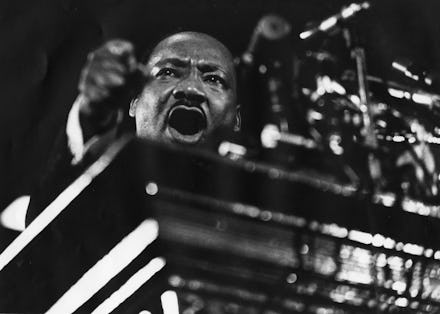47 Years After His Assassination, Watch Martin Luther King's Breathtaking Final Speech

By the late 1960s, Martin Luther King Jr. had become painfully accustomed to death threats. A decade before his April 4, 1968 assassination, a woman named Izola Curry stabbed King in the chest with a steel letter opener during a book signing in Harlem. Doctors told the young civil rights leader that the tip of her blade had come right up against his aorta — that even the slightest movement would have killed him right there.
"It came out in the New York Times the next morning that if I had merely sneezed, I would have died," he said in a speech to the Bishop Charles Mason Temple in Memphis, Tennessee on April 3, 1968. As King began to recover from the attack and comb through his mail, he came across a note from a young student at White Plains High School in New York.
"And I looked at that letter, and I'll never forget it," he recalled. "It said simply, 'Dear Dr. King, I am a ninth-grade student at the White Plains High School.' And she said, 'While it should not matter, I would like to mention that I'm a white girl. I read in the paper of your misfortune, and of your suffering. And I read that if you had sneezed, you would have died. And I'm simply writing you to say that I'm so happy that you didn't sneeze.'"
King then spoke of all he would have missed — the freedom rides, the signing of the Civil Rights Act of 1964, the march on Selma, Alabama, and the Voting Rights Act that followed in 1965 — if he had died that day, in 1958, at just 29 years old.
"I'm so happy," he repeated over and over again, "that I didn't sneeze."
King visited Memphis twice in the spring of 1968 to support black sanitation workers who were on strike against the municipal government. A protest in late March had turned violent, but King returned days later to deliver what would be his final speech, less than 24 hours before a racist drifter, James Earl Ray, assassinated him as he spoke with colleagues on a balcony at the Lorraine Motel.
In his final, remarkable flourish, King spoke with passion for the cause and a remarkable peace in the knowledge he might not survive to enjoy its promise.
"And I've looked over, and I've seen the Promised Land," he said. "I may not get there with you. But I want you to know tonight, that we as a people, will get to the Promised Land." A day later, Martin Luther King Jr. would be dead.